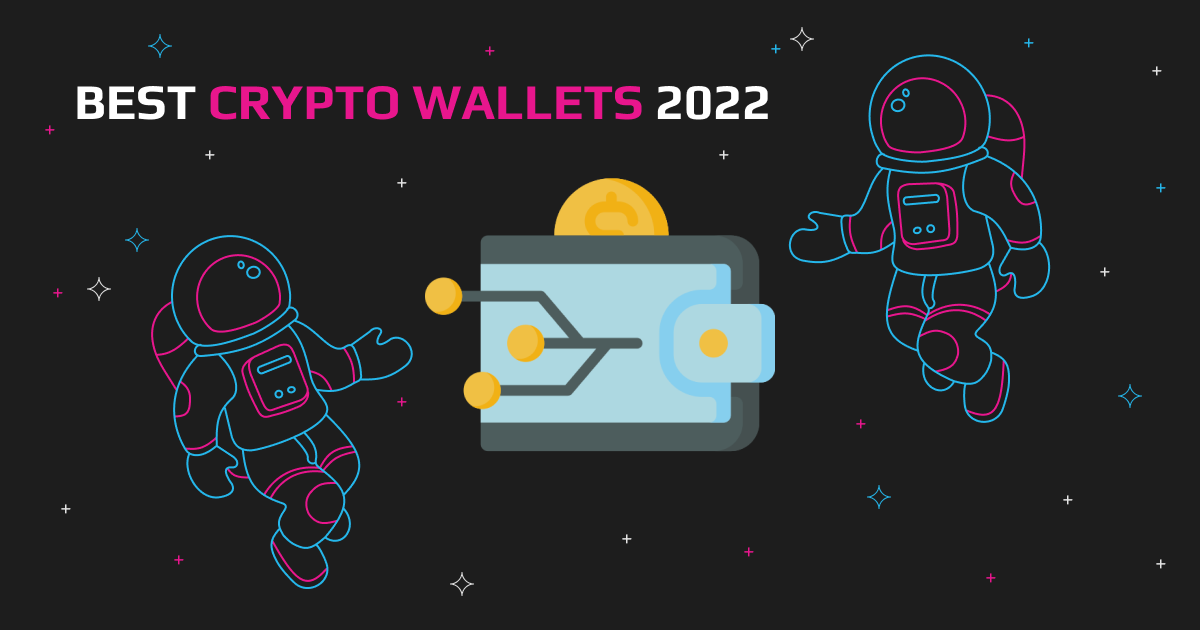If you are planning to dip your toes into cryptocurrencies, then having a cryptocurrency wallet is very crucial. While you may be tempted to store your digital assets in a cryptocurrency exchange, they are not as secure as you think. They are often targets of hacks and security breaches that result in loss of millions of user digital assets. The best way to ensure that the safety and control of your cryptocurrency is by having a cryptocurrency wallet. In this article, we explore different cryptocurrency wallets to help you discover the best crypto wallets for 2022.
What is a Crypto Wallet?
Before anything, we need to first figure out, “what is a crypto wallet?” A Cryptocurrency wallet is a wallet that stores your digital assets. The same way your physical wallet stores your money and cards, it’s the same way that a cryptocurrency wallet works, except digitally. Before cryptocurrencies came into play, digital e-wallets were being used to store fiat money to enable users to complete online or offline transactions.
Cryptocurrency wallets are the next step in the evolution of e-wallets. Their primary function is to store your cryptocurrencies. They work just like bank accounts. You can add or withdraw funds from these wallets to exchange with other coins or even make payments. Additionally, a cryptocurrency wallet is where you will organize your cryptocurrency portfolio. Therefore, they have become extremely vital components of the cryptocurrency industry.
How Do Crypto Wallets Work?
Now that we understand what cryptocurrency wallets are, the next question to answer is “how do crypto wallets work?” Crypto wallets come in various forms. Therefore, they do have different functionalities that differentiate them from one another. However, they are all designed to enable you to have secure access to your digital currencies. It’s important that you realize that a crypto wallet doesn’t actually hold any cryptocurrency.
Well, how does that work? The crypto wallet holds both the private and the public keys that you need to carry out transactions with. The cryptocurrencies themselves are stored on the blockchain. The public key operates the same way as a bank account number. You can share it with anyone and it doesn’t compromise the security of your wallet.
The private key on the other hand, allows you access to the actual crypto on the blockchain. The private key should always remain private. If anyone has access to your private keys, it’s as good as someone having access to your bank account.
Types of Crypto Wallets
There are various kinds of wallets in the cryptocurrency industry. They vary depending on storage specifications, cryptocurrency compatibility, etc. However, they all have one job: run on blockchain and enable secure crypto transactions. With that said, here are the different types of crypto wallets you can find:
- Hot Wallets: Hot wallets are wallets stored on a device that has access to the internet. Such wallets are usually loved for their high utility and accessibility. They can be accessed from anywhere, anytime.
- Cold Wallets: Cold wallets are wallets that store cryptocurrency assets in an offline storage. Simply put, they are not connected to the internet. For this reason, these wallets have a low vulnerability to online and cyber threats such as hacks.
- Hosted Wallets: Hosted wallets are usually hosted on another server where you have no control over. Because the wallet is hosted by a third-party, you don’t have access to the private key. The third-party has control over your crypto assets.
- Decentralized Wallets: Decentralized wallets give you total and complete control over your cryptocurrencies. Since they don’t rely on any third-parties, you are guaranteed complete privacy and freedom to your assets.
- Hardware Wallets: Hardware wallets are usually physical in nature and resemble USB drives. They are usually considered highly secure and perfect for anyone who wants to invest in a large amount of crypto without regular trading.
- Software Wallets: A software wallet doesn’t need to be downloaded or stored on any device. It can be accessed online through any kind of internet browser.
Hot Vs Cold Wallet Crypto
When you purchase any amount of cryptocurrency, you will have to decide whether to store it in a hot wallet, or a cold wallet. A cold wallet is typically not connected to the internet. Therefore, it’s more secure. A hot wallet, on the other hand, is always connected to the internet. Therefore, it’s more susceptible to online threats. Wondering what is the safest cryptocurrency between the two? Our best bet is the cold wallet.
How to Choose a Crypto Wallet?
Now that you are aware of the different kinds of wallets out there, you need to figure out how to choose a crypto wallet. Summarized below are a few factors that you can use as deciding factors that will help you choose a cryptocurrency wallet you need. They include:
- Backup Options: The crypto wallet you choose should at least have a backup option in the case where your device stops working. Some wallets provide a handy backup feature that enables you to restore your wallet.
- Multi-currency Support: You want to make sure that the wallet you pick has support for multiple cryptocurrencies. Having to store your digital assets across different wallets would be a tedious process.
- Security: If you are transferring lots of cryptocurrency funds, you might be comfortable with a cold wallet that can store your funds securely offline. If not, then you want a wallet that receives constant security upgrades and features to combat the risks of online threats.
- Utility: Cold wallets are extremely safe to store your cryptocurrencies. However, they don’t offer much utility. Hot wallets, on the other hand, are readily accessible and can freely allow you to withdraw or deposit crypto into the wallet without any issues.
- QR Code Scanner: I know what you are thinking, why? Well a QR code scanner is effective as it allows you to quickly generate and scan QR codes for easy crypto transfers.
- User friendliness: Some wallets are absolutely perfect for beginners. They have a friendly user interface with easy navigation. However, others are for more complex users who wish to do a little more. Do a little research to ensure that you don’t overwhelm yourself.

What is the Best Crypto Wallet?
Finding the best cryptocurrency wallet is a subjective process that entirely depends on your needs. What might be best for you, might not be best for a long-term investor, or a day-trader. The best wallet for crypto is the wallet that covers all your needs. If you are yet to decide on which wallet to use, consider these top-rated wallets below.
Metamask Wallet
What is a MetaMask wallet you ask? MetaMask is a popular crypto wallet utilized by over 1 million users globally. It’s available as a mobile app, supported on both Android and iOS and also as a Chrome extension. The wallet itself is easy to use, intuitive, and has a friendly UI. Additionally, it has a built-in exchange that enables you to buy crypto with a debit, credit card or Apple Pay. The only downside is that the MetaMask wallet only supports Ethereum tokens.
Exodus Wallet
You are probably wondering, what is Exodus wallet? Exodus wallet is a hot, non-custodial wallet. Basically what this means is that your assets are stored online but you retain access to your private key. The Exodus wallet is a visually appealing wallet with a sleek design. It runs on a number of platforms and features an app compatible with both Android and iOS. Lastly, the wallet is free to use but its in-built exchange charges a fee for every transaction.
ZenGo Wallet
The ZenGo wallet is a multi-chain wallet that offers support for over 70+ cryptocurrencies. It’s famous for its military-grade keyless technology that’s fully recoverable if you misplace your keys. The wallet has 24/7 in-app customer support along with bulletproof security and amazing simplicity. Additionally, the wallet has support for in-app crypto trading, therefore, you can easily buy, sell, or trade crypto all within the wallet. It also has an amazing UI which is very beginner-friendly.
Trustee Wallet
The Trustee wallet is an ideal wallet for a majority of users. For starters, it’s simple UI ensures that even beginners can use it. Additionally, the wallet focusses majorly on privacy and anonymity. Therefore, it collects zero usage data. You are guaranteed that you won’t receive any targeted ads because your data is being sold to any third parties. Additionally, Trustee wallet has a built-in exchange aggregator that allows you to purchase any major crypto right from the wallet.
Coinomi Wallet
Coinomi wallet is a popular wallet that is trusted by millions of users. Launched in 2014, this wallet has been a major go-to wallet for users looking for storage support, crypto-portfolio management, and trading. Coinomi offers support for over 125 networks, which represents over 1,700 coins and tokens. The wallet is available on a number of platforms including MacOS, Windows, Linux, Android, and iOS. The wallet also has a built-in exchange that allows users to swap tokens without leaving the wallet.
Jaxx Wallet
The Jaxx wallet is compatible with over 90 digital currencies. It was created in 2014 by Ethereum co-found Anthony Di Lorio. It’s popular because of its very friendly user interface that’s easy to navigate. One of the most amazing features of the Jaxx wallet is its cross-platform pairing. Basically, you can access your wallet on several devices without any hassles. Since the wallet is non-custodial, you have full control over your private key.
Mycelium Wallet
The Mycelium wallet is a mobile-only wallet that has been around since the beginning of cryptocurrencies. It has an appealing user interface and happens to be non-custodial. That means that you have access to your private keys. Additionally, the wallet has support for QR codes, allows you to set up custom transactions, and is compatible with hardware wallets such as Ledger, Trezor, and KeepKey. It also has an in-app exchange within the wallet.
Ledger Wallet
The Ledger wallet is one of the most popular wallets with it being utilized by customers in over 165 countries. The ledger wallet is a cold cryptocurrency wallet presented in two forms; the Ledger Nano S and the Ledger Nano X. Both these are hardware wallets that are compatible with a number of apps. Currently, Ledger supports over 1,800 cryptocurrencies. The only downside to them is that they are a little expensive to purchase. However, their safety features are uncontested.
Atomic Wallet
The Atomic wallet is a wallet that’s native to the DEX platform Atomic Swap. Currently, the wallet supports over 500+ cryptocurrencies. Additionally, it’s absolutely free to use without any hidden fees. It’s available on several platforms such as Windows, MacOS, and Linux. Interestingly, it utilizes BitTorrent technology to ensure that it maintains independence all while delivering a solid experience to users. The wallet also allows you to swap and purchase cryptos within the wallet using a bank card.
Bitcoin.com Wallet
Bitcoin.com wallet is a free, downloadable & easy-to-use crypto wallet that can be installed on any device. It functions on devices with Windows, Linux, MacOS, Android or even iOS. The wallet’s UI is clean and self-explanatory and easy for a beginner to understand. The wallet only works for two cryptocurrencies; Bitcoin and Bitcoin Cash. The only downside to this wallet is that it has high charges.

Crypto Wallet Comparison
In this section, we are going to let the crypto wallets go head-to-head. Through the table below, we take a look at all that you can expect from all the different crypto wallets above.
| Crypto Wallet | Type | Supported Cryptos | Price | Mobile App | Cold Storage | Cloud Storage | Incorporated Exchange |
| MetaMask | Software Wallet | Ethereum Tokens | Free | Yes | No | No | Yes |
| Exodus | Hot, non-custodial | Over 145 crypto assets | Free | Yes | No | No | Yes |
| ZenGo | Non-custodial, keyless mobile wallet | Supports over 70+ cryptos | Free | Yes | Yes | Yes | Yes |
| Trustee | Software, non-custodial wallet | Supports major coins, altcoins, & stablecoins | Free | Yes | No | No | Yes |
| Coinomi | Hot wallet | Supports 1,770+ assets | Free | Yes | No | No | Yes |
| Jaxx | Decentralized, non-custodial wallet | Supports 90+ cryptos | Free | Yes | No | Yes | Yes |
| Mycelium | Hot, non-custodialwallet | Supports fewer kinds of crypto | Free | Yes | No | Yes | Yes |
| Ledger | Cold wallet | Supports 1,800+ cryptos | Not Free | No | Yes | No | Yes |
| Atomic | Decentralized Wallet | Supports 500+ cryptos | Free, no associated costs | Yes | Yes | No | Yes |
| Bitcoin.com | Hot, non-custodial wallet | Only supports BTC & BCH | Free | Yes | No | Yes | Yes |
Swapzone & Crypto Wallets
After going through all the wallets above, we have uncovered all the different functionalities and features that every crypto wallet brings to the table. At this point, we would love to let you know that each & every one of these crypto wallets is supported by Swapzone. Basically, you can send any kind of crypto that you want from any of the above wallets to Swapzone, swap coins, and send the new coins to your wallet.


